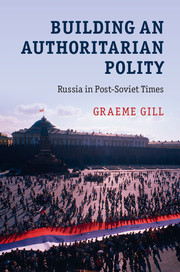Book contents
2 - Regime and society
from Part I - Structuring public political activity
Published online by Cambridge University Press: 05 November 2015
Summary
An essential part of building an authoritarian polity is the structuring of public political activity in such a way as to prevent the emergence of an effective opposition that could challenge the regime. This first dimension of rule involves what in Russia has been called the “nonsystemic” (meaning non-electoral) opposition, and the “systemic” opposition, which involves the electoral process more narrowly. This chapter will focus on the way in which the restriction of the nonsystemic opposition began under Yeltsin, before becoming more systematic under Putin. Following discussion of mechanisms for the regulation of potential and real opposition activity, the focus will then shift to the arenas in which such mechanisms were deployed in Russia to block opportunities for opposition to mobilize against the regime.
The popular mobilization of 1988–91 provided a basis upon which many had hoped a new democratic political structure would be built. Not only did such activity create a rudimentary structure for political activism in the form of autonomous organizations, parties, and elected assemblies, but it also gave a sense of legitimacy to such activity that had been lacking during the Soviet period. That legitimacy was bolstered by the democratic rhetoric of the post-Soviet period. However, in retrospect, it is clear that the prospects for democracy were much less rosy than this might suggest. The emergent political parties were generally weak, had little effective organization or resources, and usually lacked a consistent ideology to provide a sense of unity and commitment. As Chapter 1 explains, the elite-centered nature of the transition meant there was little scope for meaningful participation in political life for those bodies, which might have encouraged their institutional development, while the absence of a clear commitment to an early election in the initial period of Russian independence meant that party development could not be stimulated by the need to organize for electoral competition. As Chapter 3 shows, the result was that democratic forces in the party arena remained weak and ill organized. Moreover, the apparent strength of popular mobilization evident in 1990–91 hid the fact that in Russia this was largely confined to Moscow and was generally unable to sustain itself in the face of serious economic downturn. With the end of the Soviet Union, the drive seemed to leach out of popular mobilization as people concentrated on their more immediate problems of daily survival.
- Type
- Chapter
- Information
- Building an Authoritarian PolityRussia in Post-Soviet Times, pp. 25 - 76Publisher: Cambridge University PressPrint publication year: 2015



